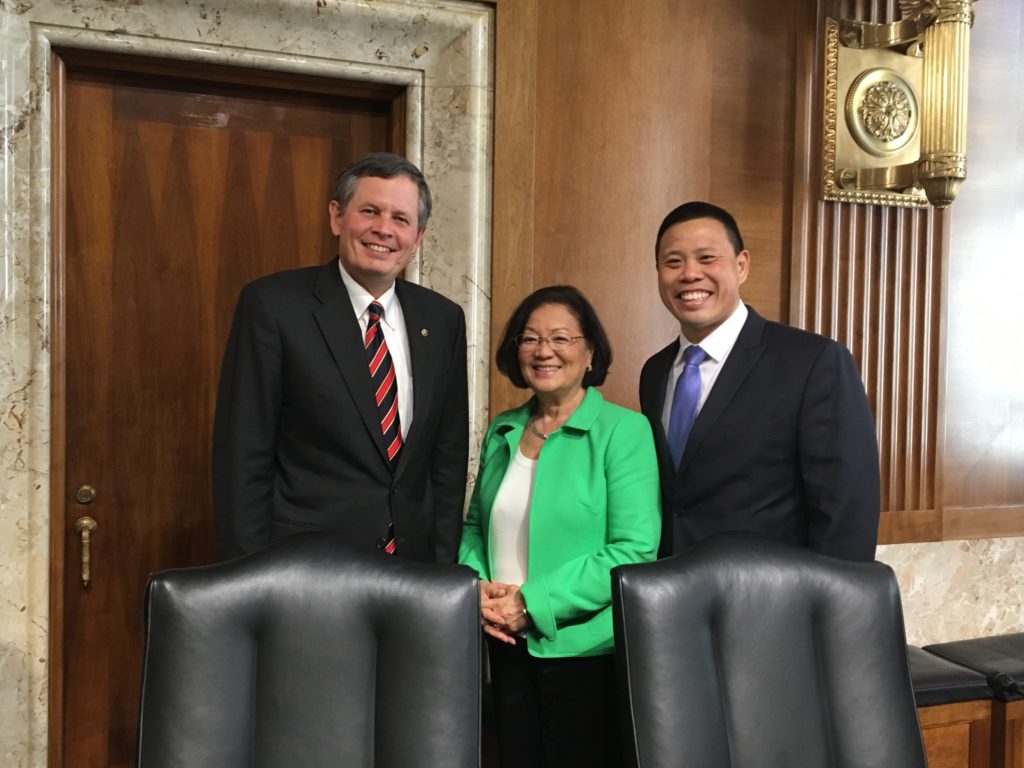On the invitation of Ranking Member Mazie K. Hirono (D-HI), John Leong – CEO of Kupu, which operates Hawaii Youth Conservation Corps – testified on benefits of Corps for participants and public lands, and how the Corps model helps create the next generation of outdoor stewards, recreationists, and entrepreneurs
Click here for a press release from the office of Sen. Mazie Hirono (D-HI)
Click here to watch a recording of the hearing
Click here for Mr. Leong’s full written testimony
WASHINGTON, DC (Sept. 27, 2017) – In a hearing organized by Sen. Steve Daines (R-MT) on “Encouraging the Next Generation to Visit National Parks,” John Leong, CEO of Kupu – a member organization of the 21st Century Conservation Service Corps (21CSC) – testified before the Senate Energy and Natural Resources Subcommittee on National Parks about how the Corps model is an effective way to engage the next generation of outdoor stewards, recreationists, and entrepreneurs.
“While America is growing more diverse and urban, and younger generations are making up a greater share of the population, these trends are not reflected in visitors to our national parks,” said Senator Hirono. “Kupu and programs like it are helping to fill this gap by training our ‘keiki’ [youth] to become stewards of the ‘aina’ [land] and serve our communities as Hawaii’s future conservationists.”
The National Park Service (NPS) celebrated its 100th anniversary in 2016 and saw a record high of nearly 331 million visitors. Today’s hearing was an opportunity for Senators to receive testimony on ways to address barriers to visitation and attract younger, more diverse users. The most recent comprehensive surveys show a marked underrepresentation of non-whitesand young adults among both park visitors and employees.
Service and Conservation Corps are locally-based organizations that provide young adults and veterans the opportunity to serve our country, advance their education and obtain in-demand job skills. Kupu is one of more than 130 Corps represented by The Corps Network. Collectively, these programs annually enroll over 25,000 youth and veterans across all 50 states, DC, Puerto Rico, and American Samoa. Additionally, Corps organize service events that generate hundreds of thousands of volunteer hours every year on public lands and in communities.
During defined terms of service in crews or individual placement positions, Corps participants – or “Corpsmembers” – gain work experience by performing important conservation, recreation, infrastructure, disaster response, and community development projects on public lands and in rural and urban communities. Through public-private partnerships, Corps work with the National Park Service and other federal, state and local agencies to complete mission-critical projects, including removing invasive species, building trails, preserving historic structures, and managing wildfires and responding to disasters. Corpsmembers have the chance to develop leadership skills and an appreciation for public lands and waters by working side-by-side with resource management professionals at America’s iconic parks, forests and refuges.
The National Park Service Centennial Act, signed into law in December 2016, included provisions that amended the Public Lands Corps Act of 1993 to help strengthen the pathway to resource management careers for Corps alumni. Specifically, the legislation raised the maximum allowable age of Public Lands Corps participants from 25 to 30, and granted two years of noncompetitive hiring authority with federal agencies to Corps alumni who served at least 640 hours.
The 21st Century Conservation Service Corps Act (S.1403, H.R.2987), a bipartisan bill reintroduced in the House and Senate this past June, would also enhance the connection between public lands and the diverse young adults and veterans who serve in Corps. Among other provisions, the 21CSC Act would make it easier for more federal agencies to enter partnerships with Corps to complete cost-effectivd mission-critical projects and engage the next generation.
“We thank the Chairman Daines, Ranking Member Hirono and the Senate Energy and Natural Resources Subcommittee on National Parks for holding this hearing, and extend our appreciation to Sen. Hirono for inviting Mr. Leong to testify on the value of Corps as a tool in engaging new park enthusiasts,” said Mary Ellen Sprenkel, President and CEO of The Corps Network and Co-Chair of the Partnership for the 21st Century Conservation Service Corps. “Kupu and other Corps programs are important partners in helping the National Park Service conserve America’s most treasured natural, historical and cultural sites and leveraging their funds and capacity. Through service on public lands, Corpsmembers develop a sense of responsibility for these places, and gain the hard skills and professional experience to succeed in careers at NPS and other resource management agencies. Corps give NPS an opportunity to engage with passionate future visitors and employees from the local community.”
“I thank Sen. Hirono for inviting my testimony on this important topic, and for her consistent support of Kupu and the Corps model,” said Mr. Leong. “Since 2007, KUPU has risen to meet the increasing demands of natural resource jobs by training over 3,500 youth. Last year, Kupuʻs 300+ corps members helped remove over 20,000 acres of invasive species and plant over 210,000 native species. While the conservation work is important, our Corpsmembers are being shaped into responsible, hard-working, and effective individuals. The ability for NPS to hire local, well-trained former Corpsmembers is a huge competitive advantage both for the park and for the young adults, many of whom come from underserved, rural communities. Corps add diversity to the National Parks in age, ethnic heritage, and socio-economic capacities.”
In addition to Mr. Leong, the witness panel at the hearing included, as listed, Ms. Lena McDowall, Deputy Director for Management and Administration, NPS; Ms. Yennie Fuller, Civil and Social Impact Manager, Niantic, Inc.; Ms. Angela Fultz Nordstrom, Vice President, NIC, Inc.; Mr. Tim Rout, CEO, AccessParks; and Mr. Will Shafroth, President and CEO, National Park Foundation.

